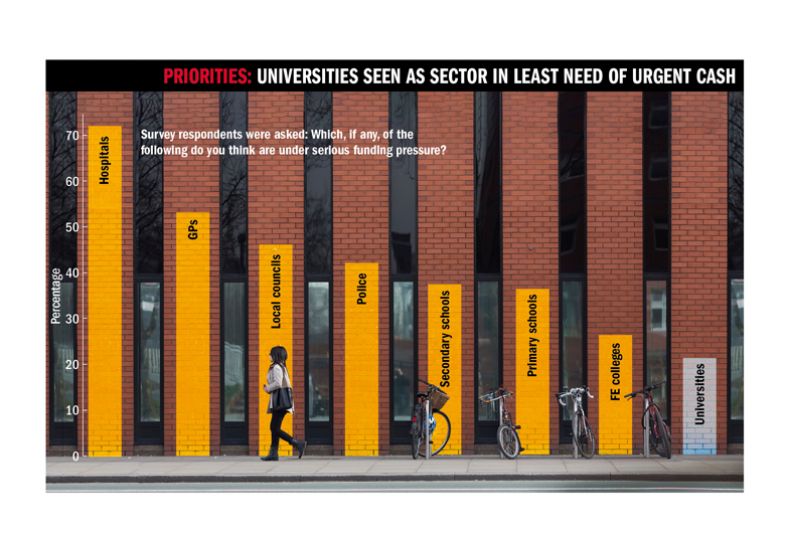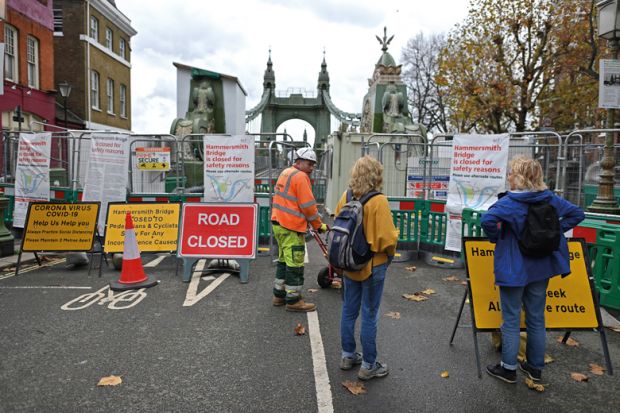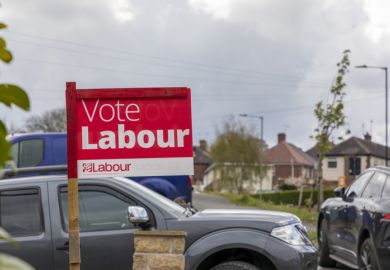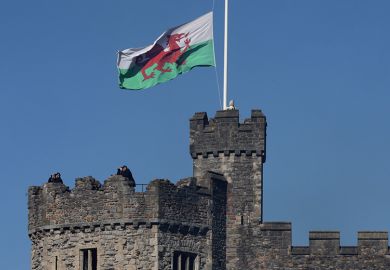Seven in 10 people would be worried if the UK university sector was hit with widespread closures, with the majority blaming the government, according to new polling.
The level of concern rises among Labour voters and when people are asked to consider the impact of their local institution shutting, putting Sir Keir Starmer’s party “in the hot seat” on this issue if it does win the coming election, said Bobby Duffy, professor of public policy and director of the Policy Institute at King’s College London, which carried out the survey, published on 20 June.
A nationally representative group of 2,683 respondents was polled in the first week of May, ahead of the general election being called, but its results shed light on how universities – and their challenges – are being viewed by the public during the campaign.
Higher education ranked towards the bottom of people’s priorities, with just 13 per cent saying it would be very important in shaping how they vote.
Universities are also seen as being far less under pressure financially than hospitals, local councils, the police and schools, the polling finds.
On the flip side, there was widespread agreement on the importance of universities in society, with 30 per cent of respondents saying the UK’s institutions rank among the best in the world – a level of esteem that puts them behind only the NHS, the armed forces and the Royal Family.
“Universities beat the BBC, the UK’s schools, police and legal system, as well as various political institutions, on this measure of who is world class,” a report on the findings says.

“And this view is shared across the political divide, with 2019 Labour and Conservative voters virtually equally likely to say UK universities are among the best in the world.”
Net satisfaction with universities has more than doubled since 1991, when the public was polled on a similar question, and Professor Duffy said this should give universities a “greater sense of confidence rather than defensiveness” as they seek to frame views about their role in society in future.
But he said it appeared that the message on the financial pressures currently impacting institutions – with one in three now having to cut jobs and courses as a result of stalling international student recruitment and the tuition fee freeze in England – had not yet filtered through to the public consciousness.
When people were asked specifically to consider the impact of a university closing, concern among those polled rose. Thirty-eight per cent say they would be very or fairly worried if between one and five universities in the UK had to close because of funding challenges, rising to 68 per cent if this number was between 30 and 40.
The future of the students attending that university is the public’s greatest concern, the polling finds, followed by the loss of educational opportunities for local people and the loss of local employment.
These findings show that people may accept some closures in a large sector, Professor Duffy said, but concern goes up “hugely” when bigger numbers are mentioned, which cannot be ruled out given the working projections about the level of deficits in universities.
Labour supporters are generally more concerned, with 73 per cent saying they would be worried by widespread closures, compared with 64 per cent of Conservative voters.
When asked who would be most to blame if an institution did have to shut, 60 per cent of all respondents say the government, double the percentage that cited university leaders.
Seventy-six per cent of Labour voters would blame the government, posing a challenge to the party if it does take power, said Professor Duffy.
“It is partly a reflection that we currently have a Conservative government, and they will have a negative view of that government, but it does show that there is a risk here for an incoming government. And if Labour were to win, they would be in the hot seat on this.”
The prospect of a university failing is said to be on the party’s list of potential crises it could face in its first 100 days in office, and the public seem to expect ministers to act in such a case.
“You can see how the urgency and the need for government support could change pretty quickly if you do start to see failure among universities,” Professor Duffy said.
“That is the sort of thing that does cut through with people. Even where it is not the government’s direct responsibility to fully provide a service, people still hold them responsible when things go wrong.”
Register to continue
Why register?
- Registration is free and only takes a moment
- Once registered, you can read 3 articles a month
- Sign up for our newsletter
Subscribe
Or subscribe for unlimited access to:
- Unlimited access to news, views, insights & reviews
- Digital editions
- Digital access to THE’s university and college rankings analysis
Already registered or a current subscriber? Login








